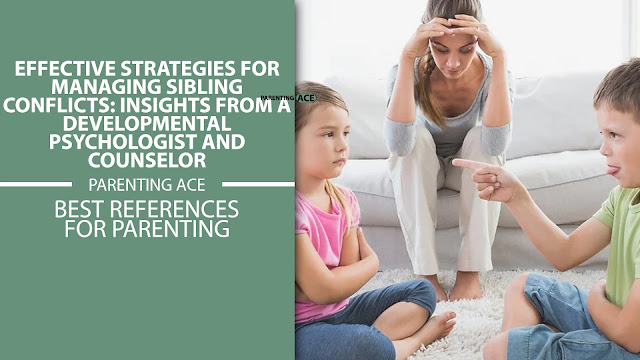Effective Strategies for Managing Sibling Conflicts: Insights from a Developmental Psychologist and Counselor
Sibling conflicts are a ubiquitous aspect of family dynamics, presenting parents with unique challenges in fostering harmony among their children. In this blog post, we delve into the realm of sibling relationships, exploring effective strategies for managing and resolving conflicts. Drawing from insights as a developmental psychologist and counselor, we offer practical advice to empower parents in nurturing positive communication, teaching conflict resolution skills, and fostering empathy among siblings. Join us as we navigate the complexities of sibling dynamics and discover how to promote healthy relationships within the family unit.
 |
| Effective Strategies for Managing Sibling Conflicts: Insights from a Developmental Psychologist and Counselor |
What Are Some Effective Strategies For Managing Sibling Conflicts?
Sibling conflicts are a common occurrence in many families and can often be a source of stress and frustration for parents. However, understanding and effectively managing these conflicts is essential for promoting healthy relationships and emotional development among siblings. As a developmental psychologist and counselor, I have encountered numerous cases of sibling conflict and have identified several effective strategies for managing and resolving these disputes.
1. Foster Positive Communication
Effective communication is key to resolving conflicts peacefully. Encourage siblings to express their feelings and concerns openly and honestly, while also teaching them active listening skills. Encourage them to use "I" statements to express their emotions without blaming or accusing their siblings. By fostering open communication, siblings can better understand each other's perspectives and work towards finding mutually agreeable solutions.
2. Teach Conflict Resolution Skills
Teaching siblings effective conflict resolution skills can empower them to resolve disputes on their own. Teach them techniques such as negotiation, compromise, and problem-solving. Encourage them to brainstorm solutions together and help them practice effective communication during conflicts. By equipping siblings with these skills, they can learn to navigate disagreements in a constructive and respectful manner.
3. Set Clear Expectations and Boundaries
Establishing clear expectations and boundaries can help prevent conflicts from escalating. Clearly define acceptable behavior and consequences for breaking the rules. Encourage siblings to respect each other's personal space and belongings. By setting clear boundaries, siblings know what is expected of them and are less likely to engage in behaviors that lead to conflicts.
4. Encourage Empathy and Understanding
Empathy plays a crucial role in resolving conflicts and fostering positive relationships. Encourage siblings to put themselves in each other's shoes and consider how their actions impact their siblings. Teach them to recognize and validate each other's feelings, even if they don't agree with them. By promoting empathy and understanding, siblings can develop greater compassion and empathy towards each other, leading to fewer conflicts.
5. Be a Positive Role Model
As parents and caregivers, it's essential to model positive conflict resolution skills and behavior. Demonstrate respectful communication, compromise, and empathy in your own interactions with your children and with others. Show siblings how to handle conflicts calmly and respectfully, and praise them when they successfully resolve disputes on their own. By being a positive role model, you can inspire siblings to emulate these behaviors in their own relationships.
Sibling conflicts are a natural part of family life, but with the right strategies and guidance, they can be effectively managed and resolved. By fostering positive communication, teaching conflict resolution skills, setting clear expectations and boundaries, encouraging empathy and understanding, and modeling positive behavior, parents can help siblings navigate conflicts in a healthy and constructive manner. As a developmental psychologist and counselor, I have seen firsthand the positive impact of these strategies in promoting sibling harmony and strengthening family relationships.




